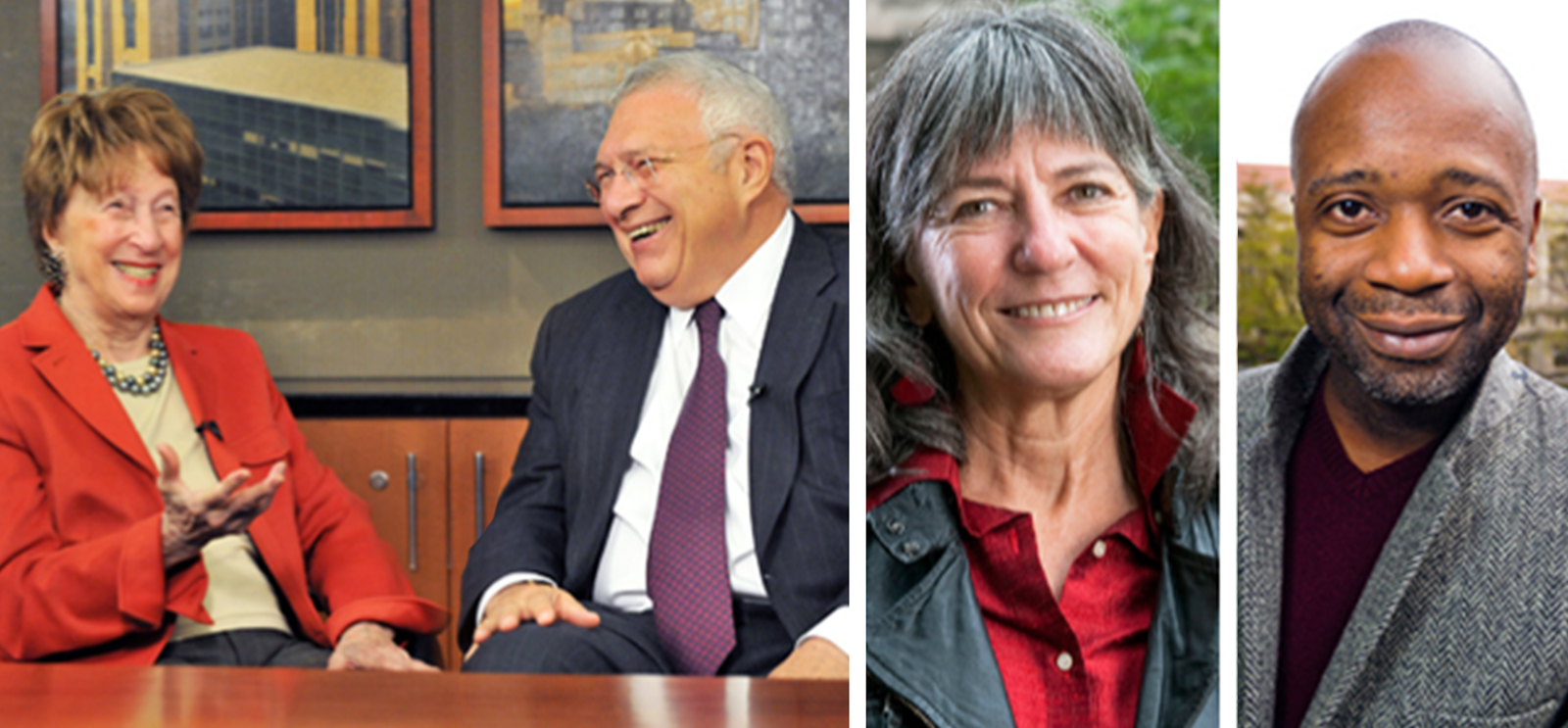Carolyn Bucksbaum and Mark Siegler, MD'67; Susan Goldin-Meadow; and, Theaster Gates. (Photos courtesy of the University of Chicago News Office)
Communication and compassion in medicine, extending the law and economics connection, a new shelf life at the Reg, and an Obama adviser leads the University's civic engagement.
Inspired by a strong doctor-patient relationship, the Matthew and Carolyn Bucksbaum Family Foundation’s $42 million gift establishes the Bucksbaum Institute for Clinical Excellence. Directed by
Mark Siegler, MD’67, the Lindy Bergman distinguished service professor of medicine, the institute will train medical students and physicians throughout their careers in communication and shared decision making to better serve patients and their families. As a patient of Siegler’s, Carolyn “Kay” Bucksbaum said she discovered “what good doctoring involved, and it was just as much about communication and compassion as his outstanding clinical competence.”
In October the Law School introduced a new initiative—Law and Economics 2.0—to expand its scholarship and influence in a field it pioneered in the 1930s. The initiative’s centerpiece is the Institute for Law and Economics, incorporating five new programs under the direction of
Omri Ben-Shahar, the Frank and Bernice J. Greenberg professor of law. The institute’s partnerships with Chicago Booth and the Department of Economics will include research on topics including climate change, immigration law, the constitutions of emerging markets, and election law.
Through next spring, almost every book in the Regenstein Library will be moved. With 430,000 volumes now stored beneath the new Mansueto Library, the Reg has room to realign its collections. General reference materials, now scattered in reading rooms from the first through fifth floors, will be merged into one alphabetical sequence on the second and third floors. The new arrangement of the bookstacks, meanwhile, will better consolidate Library of Congress classes now split across floors.
The University’s endowment grew to a market value of $6.31 billion as of June 30, reflecting an 18.8 percent return on investments for the 2011 fiscal year. That follows an 18.9 percent return in 2010 despite a lower-risk profile and increased liquidity that the University established after the 2008 financial crisis. The average return over the past three years was a 3.5 percent gain, 6.8 percent over the past five years, and 8.3 percent during the previous decade.
Susan Goldin-Meadow has received the American Psychological Association’s Mentor Award in Developmental Psychology. The Bearsdley Ruml distinguished service professor in psychology, Goldin-Meadow is an expert on gesture. Former students who have become leaders in the field make recommendations for the award.
A Cummings Life Science Center researcher was hospitalized in August with a skin infection from the
Bacillus cereus bacterium she studied. The scientist, identified only as a female researcher, has recovered, and research has resumed at Cummings after a three-week suspension to decontaminate the lab. Because contracting
Bacillus cereus requires direct skin contact, officials believe the infection occurred after the bacteria came into contact with an open wound. Two years ago, molecular-genetics professor Malcolm Casadaban died after contracting an infection from a weakened strain of the plague.
Derek Douglas, a senior adviser to President Obama on urban policy, will join the University in January as vice president for civic engagement. As special assistant to the president since 2009, Douglas has led programs such as the Neighborhood Revitalization Initiative and the Partnership for Sustainable Communities. He will oversee the Office of Civic Engagement, created in 2008 to centralize the University’s efforts in local and state government relations and strengthen its intellectual and cultural ties to the city.
The University and the City of Chicago have entered into a memorandum of understanding to collaborate on South Side economic development. The memorandum outlines a University commitment to work with the city on $1.7 billion in projects over the next five years, including neighborhood-improvement grants, programs to help community residents find work at the University and other business partners, and employer-assisted housing in surrounding neighborhoods. UChicago has also pledged an additional $2.5 million toward improving the 59th Street Metra station and reopening the 60th Street station.
The first of two planned campus child-care centers will be operated by Bright Horizons Family Solutions, the University announced in October. Scheduled to open in fall 2012, the facility on Drexel Avenue will serve the children of University and Medical Center employees, postdocs, and students. The second facility will open the following year on Stony Island Avenue, south of 58th Street. Both centers will accommodate 124 children between six weeks and five years old.
Larry Norman will serve a second term as deputy provost for the arts. In his three-year tenure Norman, professor of Romance languages and literatures, theater and performance studies, and the College, has coordinated the development of the Reva and David Logan Center for the Arts, scheduled to open next spring, and the launch of the Richard and Mary L. Gray Center for the Arts.
Theaster Gates, the University’s director of arts programming, resident artist, and lecturer, will lead a new effort to enrich cultural interaction with the surrounding community. Directing the Arts and Public Life Initiative, Gates will develop artist residencies, promote partnerships between the University and South Side cultural institutions, establish youth apprenticeships, and enhance arts education. The initiative’s flagship project, the Washington Park Arts Incubator, to open in 2012, will offer space for performances, exhibitions, and community gatherings.

